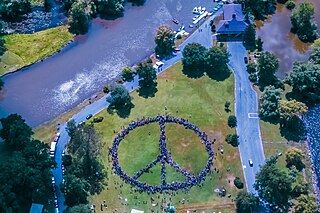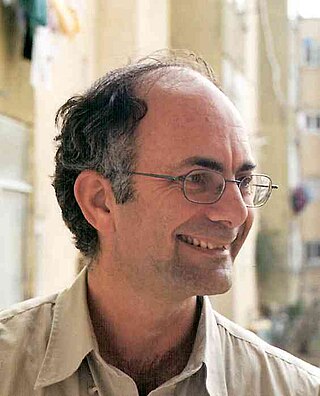
The United States Institute of Peace (USIP) is an American federal institution tasked with promoting conflict resolution and prevention worldwide. It provides research, analysis, and training to individuals in diplomacy, mediation, and other peace-building measures.
Abdul Aziz Said was Professor Emeritus of International Relations in the School of International Service at American University, Washington, D.C., and founding Director of the university's International Peace and Conflict Resolution Division. Said was well known for helping shift the focus of International Relations theory from real politic-based on the concept that the law of power governs states, to new world order-based on cooperation and common security. Starting in the 1990s Said focused his work on peace and conflict resolution and later explored the relationship between spirituality and religion in international politics.
Track II diplomacy or "backchannel diplomacy" is the practice of "non-governmental, informal and unofficial contacts and activities between private citizens or groups of individuals, sometimes called 'non-state actors.' " It contrasts with track I diplomacy, which is official, governmental diplomacy that occurs inside official government channels. However, track two diplomacy is not a substitute replacement for track one diplomacy. Rather, it is there to assist official actors to manage and resolve conflicts by exploring possible solutions derived from the public view and without the requirements of formal negotiation or bargaining for advantage. In addition, the term track 1.5 diplomacy is used by some analysts to define a situation where official and non-official actors cooperate in conflict resolution.

Peacebuilding is an activity that aims to resolve injustice in nonviolent ways and to transform the cultural and structural conditions that generate deadly or destructive conflict. It revolves around developing constructive personal, group, and political relationships across ethnic, religious, class, national, and racial boundaries. The process includes violence prevention; conflict management, resolution, or transformation; and post-conflict reconciliation or trauma healing before, during, and after any given case of violence.

The United Nations Department of Political and Peacebuilding Affairs (DPPA) is a department of the Secretariat of the United Nations (UN) with responsibility for monitoring and assessing global political developments and advising and assisting the UN Secretary General and his envoys in the peaceful prevention and resolution of conflict around the world. The department manages field-based political missions in Africa, Central Asia, and the Middle East, and has been increasing its professional capacities in conflict mediation and preventive diplomacy. DPPA also oversees UN electoral assistance to Member States of the organization. Established in 1992, the department's responsibilities also include providing secretariat support to the UN Security Council and two standing committees created by the General Assembly concerning the Rights of the Palestinian People and Decolonization. DPPA is based at the UN Headquarters in New York City.

Frederick "Rick" Barton is a United States diplomat, educator, and author. He served as the founding Assistant Secretary of State for the Bureau of Conflict and Stabilization Operations at the U.S. Department of State until September 2014. Currently a lecturer at Princeton University's School of Public and International Affairs, he is also the co-director of the university's Scholars in the Nation's Service Initiative (SINSI) with his wife, Kit Lunney.
Marc Gopin is the director of the Center for World Religions, Diplomacy and Conflict Resolution (CRDC), and James H. Laue Professor at the School of Conflict Analysis and Resolution at George Mason University.

Yehuda Stolov, an Israeli, is a founder and the executive director of the Interfaith Encounter Association (IEA). He currently resides in Jerusalem with his wife, Lia and his three kids.
The Center for World Religions, Diplomacy and Conflict Resolution (CRDC) is an arm of George Mason University's Jimmy and Rosalynn Carter School for Peace and Conflict Resolution. CRDC engages in practice, education, and research concerning peace-building in conflicts where religion and culture play a significant role in a destructive conflict. CRDC specializes in entrepreneurial engagement with partners, students and supporters who share the goal of promoting emerging networks of indigenous and global peacemakers; mobilizing support for them; and forging links between such people, citizen-diplomats, and policymakers.
Mohammed Abu-Nimer is an American expert on conflict resolution and dialogue for peace. He is a full professor at the American University School of International Service in International Peace and Conflict Resolution in Washington, DC, the largest school of international relations in the United States.
Center for Justice and Peacebuilding (CJP) is an accredited graduate-level program founded in 1994. It also offers non-credit training. The program specializes in conflict transformation, restorative justice, trauma healing, equitable development, and addressing organizational conflict. CJP is housed at Eastern Mennonite University (EMU) in Harrisonburg, Virginia, which describes itself as "a leader among faith-based universities" in emphasizing "peacebuilding, creation care, experiential learning, and cross-cultural engagement." One of the three 2011 Nobel Peace Laureates, Leymah Gbowee of Liberia, earned a master's degree in conflict transformation from CJP in 2007.
James Wuye is a Pastor of the General Council of the Assemblies of God Nigeria and co-director with Imam Muhammad Ashafa of the Interfaith Mediation Center of the Muslim-Christian Dialogue in Kaduna, Kaduna State, Northern Nigeria.
Imam Muhammad Ashafa is co-director with Pastor James Wuye of the Interfaith Mediation Center of the Muslim-Christian Dialogue in Kaduna, Kaduna State, Northern Nigeria.
Ephraim Isaac is an Ethiopian scholar of ancient Ethiopian Semitic languages and of African and Ethiopian civilizations. He is the director of the Institute of Semitic Studies based in Princeton, NJ. and the chair of the board of the Ethiopian Peace and Development Center.

The Jewish-Palestinian Living Room Dialogue Group is a non-violent conflict resolution group established in 1992 in San Mateo, California. Its first meeting was held in a local neighborhood residence. As of September 2019, the group remained active and continued to meet monthly in members' homes. The one-to-one, face-to-face method of conflict resolution, modeled by this dialogue group, was increasingly looked to globally by educators, researchers, journalists, activists, trainers, and strategists including the U.S. Department of State, which distributes the dialogue group's instructive films in Africa.

Hizkias Assefa (1948) is a conflict mediator known widely in Africa for his non-aligned work as a consultant who has mediated in most major conflict situations in sub-Saharan Africa in the past 20 years, as well as in a dozen countries elsewhere. He is also a professor of conflict studies. Of Ethiopian origin, he is based in Nairobi, Kenya. He was one of the founding faculty members in 1994 of the Conflict Transformation Program at Eastern Mennonite University.

Jamila Afghani is a feminist and an activist for women's rights and education in Afghanistan. She is the founder and executive director of the Noor Educational and Capacity Development Organization (NECDO). She is also an executive member of the umbrella organization, Afghan Women's Network (AWN). In 2022, Jamila Afghani was awarded the seventh annual Aurora Prize for Awakening Humanity.

The Geneva peace talks on Syria, also known as Geneva III, were intended peace negotiations between the Syrian government and opposition in Geneva under the auspices of the UN. Although formally started on 1 February 2016, they were formally suspended only two days later, on 3 February 2016.
Tanenbaum Center for Interreligious Understanding is a secular non-profit organization that works to promote mutual respect and understanding and fight religious prejudice in workplaces, schools, health care settings and conflict zones. Headquartered in New York, New York, Tanenbaum was founded in 1992 by Georgette Bennett in memory of her late husband, Rabbi Marc H. Tanenbaum. Tanenbaum's activity revolves around five programs: religion and diversity in the workplace, religion in education, religion and healthcare, religion and conflict resolution, and the religious roots of prejudice and interreligious affairs.

Thania Paffenholz, born on 2 February 1965 in Cologne, Germany, is an academic and policy advisor working on peace processes. She is currently Director of Inclusive Peace. Thania Paffenholz has led comparative research of peace processes for over two decades and has been an advisor in peace processes in Mozambique, Angola, Somalia, Kenya, Uganda, South Sudan, Mali, Afghanistan, Nepal, Sri Lanka, Myanmar, Yemen, Egypt, El Salvador, Syria and Colombia. She received the Wihuri International Prize in 2015 for her work as a peace researcher.









